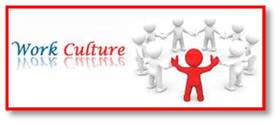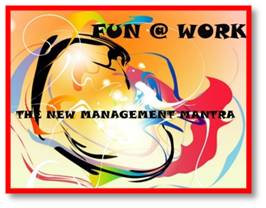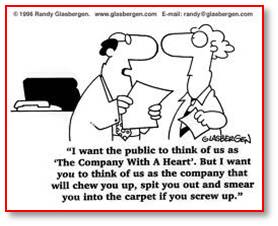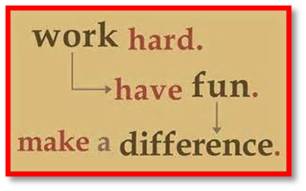Monday Author: Susanne Skinner
When I hear the expression work culture I immediately think extremes – good and bad. Having worked in both a good one is high on my list of job must haves; in fact I will accept nothing less. Next to sleeping I spend the largest part of my week at work. I need to get up every morning and feel good about going there. Anything else makes for a bad day at the office.
 As unemployment in the high tech industry has escalated, the need for a steady paycheck has caused the importance of choosing a healthy corporate culture to fall by the wayside. Job seekers are forced to accept positions below their qualification and salary levels. That makes it harder to tout the value of a healthy work culture and yet it’s just as important. You want the right position and salary but if you must accept less on those levels it is even more important to make an investment in the right culture. To me, it’s a competitive differentiator between a job and work that is fulfilling and fun.
As unemployment in the high tech industry has escalated, the need for a steady paycheck has caused the importance of choosing a healthy corporate culture to fall by the wayside. Job seekers are forced to accept positions below their qualification and salary levels. That makes it harder to tout the value of a healthy work culture and yet it’s just as important. You want the right position and salary but if you must accept less on those levels it is even more important to make an investment in the right culture. To me, it’s a competitive differentiator between a job and work that is fulfilling and fun.
How do you find a healthy work environment? It begins with the interview process. It is in every candidate’s best interest to analyze a company’s culture along with job deliverables. Not every candidate is a match for every company – it takes extra effort on both sides to put that into perspective. The match between an organization’s culture and a candidate’s personality sit side by side with technical skills and related job experience. Work culture looks beyond skills and assesses personality.
The best companies have figured this out and invest in an extended interview process that includes a candidate’s personality and fit into the corporate culture. By providing a transparent look inside the company, both employee and employer are more likely to make the right decision. Don’t be afraid to ask questions that will offer up a profile of what it’s really like to work there.
A stroll through company reviews on a site like Glassdoor will confirm that people don’t quit a job, they quit a company. The majority of reviewer’s dissatisfaction reflects the failure of a culture and that is something to pay attention to. There is a grain of truth in these reviews, though most are written by former employees who felt the sting of a changing culture as they exited the building.
Choosing a positive work environment is the difference between a successful career stint and a miserable experience for employer and employee. Statistics would agree with that. On average it costs employers about two times a person’s salary to replace a hire that was a bad fit.
Company Personality
 This brings us to the million dollar definition – what does a healthy corporate culture look like? Every company has a personality with unique attributes and quirks, from how management treats employees to how employees treat one another, view customers and conduct business. A healthy corporate culture can make your business thrive; an unhealthy one results in loss of morale and declining business. That leads to high attrition and a constant struggle to understand and meet goals for those left behind. Nothing thrives in a toxic culture.
This brings us to the million dollar definition – what does a healthy corporate culture look like? Every company has a personality with unique attributes and quirks, from how management treats employees to how employees treat one another, view customers and conduct business. A healthy corporate culture can make your business thrive; an unhealthy one results in loss of morale and declining business. That leads to high attrition and a constant struggle to understand and meet goals for those left behind. Nothing thrives in a toxic culture.
A culture is something you feel as well as see. It is a powerful element that manifests itself throughout a workplace. It is the values, beliefs, styles, and experiences reflected in the behavior of the employees. It will shape your relationships, productivity, work enjoyment and most of all, your success.
Culture also shows itself in the physical space. During an interview, look at how the space is allocated and ask, “Does it feel like it promotes interaction and connectivity, or isolation and imperialism?” Go with your gut instincts — nine times out of ten you will be right. The gulag approach is hard to hide. If there are no personal touches on desks or walls there is a good chance it reflects the temporary mindset of the people working there and the personality of the company. Visual cues give you a sense of what you are walking into. You should also listen for laughter; it’s a good sign.
 Zappos CEO Tony Hsieh is big on cultural fit. He says that in the early stages of the on line retail company, “bad hires cost us $100 million.” That’s an expensive learning curve and today the company ties their hiring to a strong fit with their culture. That culture is well defined and posted on Zappos web site, complete with videos. Anyone considering employment sees visual proof that Zappos talks and walks their cultural beliefs.
Zappos CEO Tony Hsieh is big on cultural fit. He says that in the early stages of the on line retail company, “bad hires cost us $100 million.” That’s an expensive learning curve and today the company ties their hiring to a strong fit with their culture. That culture is well defined and posted on Zappos web site, complete with videos. Anyone considering employment sees visual proof that Zappos talks and walks their cultural beliefs.
A word of caution – a statement on a company web site does not automatically make it true. Many a company has a formulaic statement about their culture put there without any thought to its meaning or ability to execute on it. You need to research it just as you would any aspect of potential employment. Look for the gaps between the culture the statement intends to create and the one employees actually experience.
Corporate Values
Culture begins at the management level but it is a shared responsibility. Leaders may define what it should be, but employees manifest it – they are the workplace culture. Certain standards should apply. A healthy culture has good communication. This tells you they value speaking, listening and feedback. Show me a company with good communication and I will show you a good place to work.
The presence of structure, innovation, mutual respect and social responsibility weigh heavily in a healthy culture. As you look deeper into a company’s profile these should be easy enough to determine and verify. Web sites, blogs, books and Ted Talks abound on this subject for those who seek it.
 It comes down to this. Know what is important in the environment you want to work in. After you’ve read all the definitions create your own because at the end of the day that is what will matter to you.
It comes down to this. Know what is important in the environment you want to work in. After you’ve read all the definitions create your own because at the end of the day that is what will matter to you.
There are also unwritten traits that have an immense impact on a company culture. I have a list of good ones drawn from my experience with bad ones. I’m including them here because no matter what else I consider, these are make-or-break decision makers when I am considering a job offer.
- No fear/no ego work environment: Everyone has a job to do, from the CEO right down to you. You will do your best if you come in each day knowing you are valued for who you are and what you contribute. No one should work in an environment governed by fear. A big ego is a big negative.
- Creativity: Everyone should be invited to contribute what they bring. I want my creativity (and experience) to make a difference.
- Individual recognition: We all play for the same team, but it’s important to be recognized for above the bar individual efforts and outstanding work contributions.
- Credibility: You have it, they have it – everybody wins.
- Balance: I can do my job well in the 40 or so hours I am paid to do it. When it’s crunch time, I’m right there with you. When my work for the day is done I want to go home and enjoy the many reasons I work.
- Camaraderie: Be part of a team that likes and respects its members and values their contributions. We have Chocolate Fridays – big plus.
- Fun: This is last because I want you to remember it. Work can and should have an element of fun in it. There is nothing wrong with having fun at work. It’s more important than you think.
A company’s greatest assets are its human resources. Employees that like where they work are as important as satisfaction from the work itself. Passion fuels employee morale which in turn fuels productivity – and that fuels the bottom line.
Workplace culture should be a work in progress. The minute it stops evolving it becomes stagnant and ultimately declines. It is a powerful tool and a competitive differentiator that underwrites a healthy and productive organization. Don’t settle. As Tony Hsieh reminds us “Happiness is a business model.”
